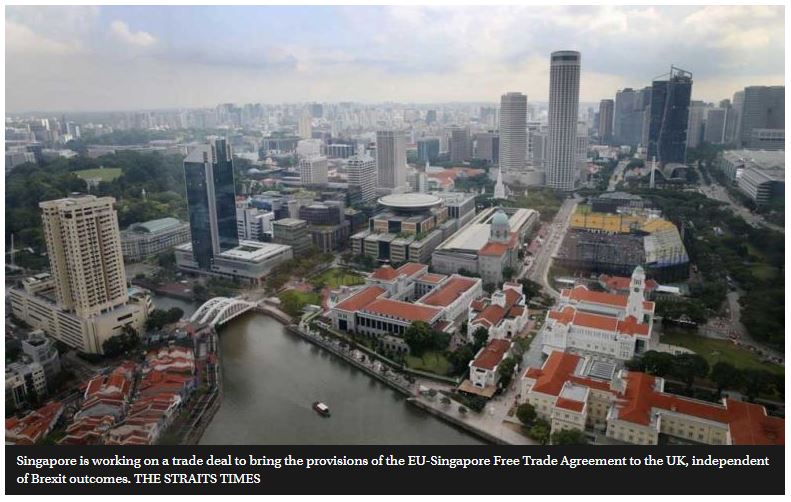Brexit may have minimal impact on Singapore
Singapore’s limited exposure in terms of trade and investment in Britain could see the Republic emerge relatively unscathed from Brexit, which remains mired in uncertainty after a chaotic parliamentary session in Britain last week, analysts said.
Singapore’s trade with Britain accounted for only one per cent of its total exports and 2.1 per cent of its total imports last year, United Overseas Bank economist Barnabas Gan told the Straits Times.
It also helps that the city state is already working on a trade deal to bring the provisions of the EU-Singapore Free Trade Agreement to the UK, independent of Brexit outcomes.
DBS Bank chief economist Taimur Baig said such an extension “should help trade and investment flows to continue unabated”.
Gan said: “Even if a hard Brexit occurs, where the UK leaves the EU without a deal, Singapore’s trading relationship with the UK will see little impact given that trade is based on the World Trade Organisation terms.”
The short-term impact of a no-deal Brexit is also likely to be centred on financial markets, with Baig noting that this will be reflected primarily on the pound, stock market and properties.
While investment sentiment will be hurt and consumption may be disrupted, he said there are also likely to be fiscal and monetary accommodation to offset these, on top of other potential gains.
“We don’t expect UK companies pulling out of Singapore. If anything, we expect the opposite,” he said, citing home appliance maker Dyson’s relocation of its headquarters to Singapore this year.
“As investment uncertainties rise, it would make sense for some UK-based companies to explore more stable and business-friendly jurisdictions.”
As of 2017, UK foreign direct investment in Singapore was around $85 billion, making it the sixth largest source.
But Gan cautioned that the longer-term impact of Brexit is less predictable. Dampened growth and trade momentum globally and in the EU are expected to “inject further downside risks to Singapore’s growth prospect”, he said.
European Chamber of Commerce president Federico Donato said among companies in Singapore, small and medium-sized enterprises will be least prepared for Brexit, with those planning to cover the European market from the UK likely to face more challenges.
While Singaporeans also have exposure to the UK’s property and education sectors, firms remain sanguine on their long-term prospects.
UK real estate capital down
Even though the total UK real estate investment volume was down 22 per cent year-on-year for the first half of this year, at £21.5 billion ($26.8 billion), Trinity House Investments managing director Quah Kay Beng said the slowdown may be only temporary.
Singapore capital into UK real estate may have fallen almost 40 per cent from 2018 to 2019 year-to-date, added Quah, but Trinity’s acquisitions in the UK rose about 30 per cent this year compared with last year.
He added that the UK real estate market is still “a stable long-term, positive asset class” given the low interest rate environment globally and potential easing in monetary policies by the US, the European Central Bank and the Bank of Japan.
Sabrina Hussain, student placement manager at overseas education consultancy IDP Education, said parents interested in sending their children to the UK expressed worry after it voted to leave the EU in 2016.
But an “international education strategy” unveiled by the UK in March, which aims to raise its international student numbers from around 460,000 enrolled in British higher education now to 600,000 by 2030, suggests more will be done to keep it an attractive option, she said.
THE STRAITS TIMES


 English
English




